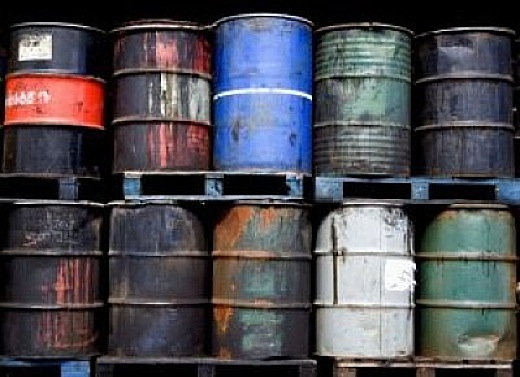 image above: Corroding oil drums stacked on pallets.
From http://www.hooversbiz.com/2008/02/29/100-oil-getting-past-the-novelty-value
By Daniel Dicker on 21 October 2009 in The Street -
http://www.thestreet.com/story/10614660/1/oil-price-disconnect-hurts-us-all.html#
Why isn't anyone getting mad about the lunacy of the oil market? Why isn't anyone asking, "What is going on here?" anymore. It must be the highflying stock market and decent earnings reports, convincing us that at least the financial end isn't nigh. Everybody must be too busy trying to make back the money they lost last year to care about the catastrophe in oil that is replaying itself.
Last year, as oil ratcheted up to $150 a barrel, I felt alone in screaming about the obvious decoupling of the fundamentals from the price, fighting the opposite viewpoints of the likes of heavyweights such as then-Secretary of the Treasury Hank Paulson and Nobel Prize-winning economist Paul Krugman.
image above: Corroding oil drums stacked on pallets.
From http://www.hooversbiz.com/2008/02/29/100-oil-getting-past-the-novelty-value
By Daniel Dicker on 21 October 2009 in The Street -
http://www.thestreet.com/story/10614660/1/oil-price-disconnect-hurts-us-all.html#
Why isn't anyone getting mad about the lunacy of the oil market? Why isn't anyone asking, "What is going on here?" anymore. It must be the highflying stock market and decent earnings reports, convincing us that at least the financial end isn't nigh. Everybody must be too busy trying to make back the money they lost last year to care about the catastrophe in oil that is replaying itself.
Last year, as oil ratcheted up to $150 a barrel, I felt alone in screaming about the obvious decoupling of the fundamentals from the price, fighting the opposite viewpoints of the likes of heavyweights such as then-Secretary of the Treasury Hank Paulson and Nobel Prize-winning economist Paul Krugman. This year, every oil analyst who comes on CNBC now seems to sound like me: "A liquidity trade," they crow. "A play on the weak dollar," they advise. These are euphemisms for a market with no tethers to supply and demand fundamentals, and it's arguably worse now than it was last year, as we have the added fuel of rapidly expanding ETFs in energy to add kerosene to this already raging liquidity fire. But now that we're all "on the same page" on what's causing this, I am astounded by the blithe spirit of all of these analysts. I wonder where the outrage is. Where is the concern?
People continue to forget that commodities aren't stocks.
If the stock market runs ahead of itself and decouples from its fundamentals, as most experts believe it probably has now, no one needs to get outraged about it. If stock prices have now gotten ahead of reasonable forecasts for earnings and growth, everyone still understands the game: You make your bets and take your chances.
But oil decoupling hurts everyone. It hurts American consumers and reduces purchasing power. It sends more than $200 billion a year overseas into sovereign wealth funds of Middle Eastern countries that don't like us very much.
For American business, it's even worse: Fully 25% of the companies represented by the New York Stock Exchange are energy-dependent. Nothing can have a bigger and more direct impact on the productivity and potential for our economy more directly than the price of the crude barrel.
And now, there's one recent trend to assure prices go even further up, making these ridiculous prices look cheap: Domestic refineries are being forced to shut down. Sunoco has closed a big refinery in New Jersey, and Valero has shut one of its largest in Aruba.
They've done this to combat puny margins caused by rising liquidity and investment-driven crude prices. And I think more shutdowns are on their way. They've got no choice, the refiners. They're fighting back the only way they can. But these shutdowns will cause a synthetic shortage of refined products -- the stuff people actually use. It's already beginning. The Department of EnergyWe're catastrophe-driven, I guess, and when the catastrophe looks to be averted, everyone forgets.
Last year, I screamed to make a point about the lunacy of oil pricing. This year, in a way that has astounded me, the disaster is repeating itself in perhaps even worse form. This year, it seems, that's what I'll have to be screaming about.
No comments :
Post a Comment